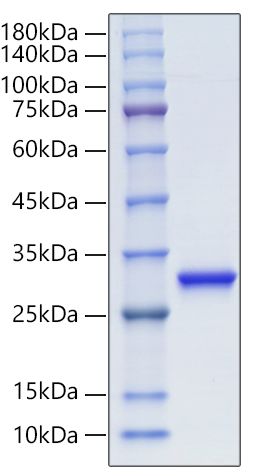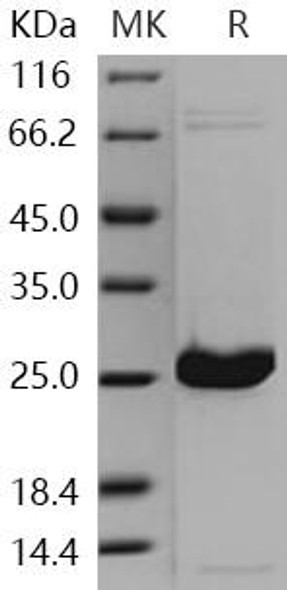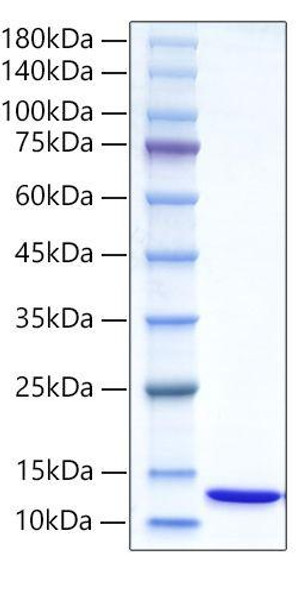Description
Recombinant Human Ubiquitin thioesterase L1/UCHL1 protein
The Recombinant Human Ubiquitin thioesterase L1/UCHL1 protein is a biologically active recombinant protein that plays a significant role in various cellular processes and signaling pathways in human biology. This protein is widely employed in immunological research, cell biology studies, protein-protein interaction analyses, and therapeutic development, providing researchers with a reliable tool for investigating Ubiquitin thioesterase L1/UCHL1 protein function and its implications in health and disease.
This product (SKU: RPCB0104) is produced using advanced expression systems and features a C-His tag for convenient detection and purification. The protein exhibits a calculated molecular weight of 25.66 kDa with an observed molecular weight of 26-30 kDa under denaturing conditions, achieving ≥ 95 % as determined by SDS-PAGE., ensuring exceptional quality and consistency for research applications.
Key Features
| High Purity by Affinity Chromatography | |
| Mammalian & Bacterial Expression Systems | |
| High lot-to-lot consistency via strict QC |
| Product Name: | Recombinant Human Ubiquitin thioesterase L1/UCHL1 protein |
| SKU: | RPCB0104 |
| Size: | 10 μg , 20 μg , 50 μg , 100 μg |
| Reactivity: | Human |
| Synonyms: | UCHL1, Ubiquitin carboxyl-terminal hydrolase isozyme L1, UCH-L1, EC:3.4.19.12, Neuron cytoplasmic protein 9.5, PGP 9.5, PGP9.5, Ubiquitin thioesterase L1 |
| Tag: | C-His |
| Calculated MW: | 25.66 kDa |
| Observed MW: | 26-30 kDa |
| Gene ID: | 7345 |
| Protein Description: | High quality, high purity and low endotoxin recombinant Recombinant Human Ubiquitin thioesterase L1/UCHL1 protein (RPCB0104), tested reactivity in E. coli and has been validated in SDS-PAGE.100% guaranteed. |
| Endotoxin: | < 1 EU/μg of the protein by LAL method. |
| Purity: | ≥ 95 % as determined by SDS-PAGE. |
| Formulation: | Lyophilized from a 0.22 μm filtered solution of 20mM Tris-HCl, 250mM NaCl, 0.05% Tween80, 1mM DTT, pH 8.5. |
| Reconstitution: | Centrifμge the vial before opening. Reconstitute to a concentration of 0.1-0.5 mg/mL in sterile distilled water. Avoid vortex or vigorously pipetting the protein. For long term storage, it is recommended to add a carrier protein or stablizer (e.g. 0.1% BSA, 5% HSA, 10% FBS or 5% Trehalose), and aliquot the reconstituted protein solution to minimize free-thaw cycles. |
| Storage: | Store at -20℃. Store the lyophilized protein at -20℃ to -80℃ up to 1 year from the date of receipt. After reconstitution, the protein solution is stable at -20℃ for 3 months, at 2-8℃ for up to 1 week. |
Ubiquitin carboxyl-terminal hydrolase isozyme L1, also known as UCH-L1, is a deubiqutinating enzyme with important functions in recycling of ubiquitin. Regulated proteolysis by the ubiquitin pathway has been implicated in control of the cell cycle, transcriptional activation, cell fate and growth, and synaptogenesis. The ubiquitin-proteasome system is involved in synaptic plasticity and is proposed to be part of a molecular switch that converts short-term synaptic potentiation to long-term changes in synaptic strength. UCHL1 is found in neuronal cell bodies and processes throughout the neocortex (at protein level). It is expressed in neurons and cells of the diffuse neuroendocrine system and their tumors. UCHL1 is weakly expressed in ovary. UCHL1 is a ubiquitin-protein hydrolase. It is involved both in the processing of ubiquitin precursors and of ubiquitinated proteins. This enzyme is a thiol protease that recognizes and hydrolyzes a peptide bond at the C-terminal glycine of ubiquitin. UCHL1 also binds to free monoubiquitin and may prevent its degradation in lysosomes. The homodimer of UCHL1 may have ATP-independent ubiquitin ligase activity. UCHL1 dysfunction has been associated with neurodegeneration in Parkinson's, Alzheimer's, and Huntington's disease patients. Reduced UCHL1 function may jeopardize the survival of CNS neurons.





